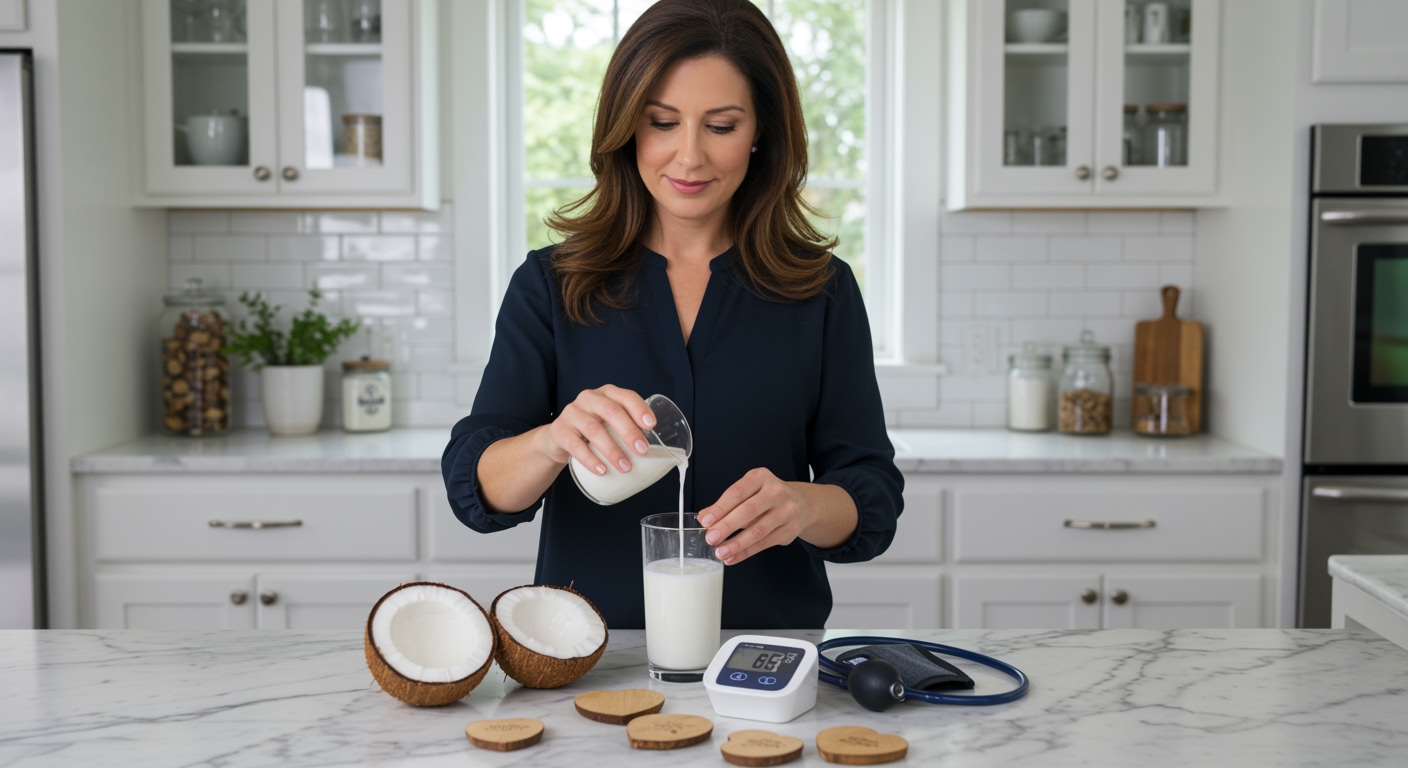✪ Key Takeaway: Coconut milk can help lower blood pressure due to its high potassium content and beneficial fats that support cardiovascular health.
Introduction
Your doctor just told you to watch your blood pressure, and now you are questioning every food choice you make.
You might be wondering if that creamy coconut milk in your morning coffee or curry is helping or hurting your cardiovascular health.
Hi, I am Abdur, your nutrition coach, and today I am going to explain exactly how coconut milk affects your blood pressure and what the science really says about this tropical ingredient.
What Makes Coconut Milk Different From Other Plant Milks?
Coconut milk stands apart from other plant-based milks because of its unique fatty acid profile and mineral content.
Unlike almond or oat milk, coconut milk contains medium-chain triglycerides that your body processes differently than regular fats.
These MCTs go straight to your liver for energy instead of being stored as fat, which can benefit your cardiovascular system.
Fresh coconut milk also provides significant amounts of potassium, a mineral that directly counteracts sodium effects on blood pressure.
One cup of coconut milk contains about 630 milligrams of potassium, which is roughly 13% of your daily needs.
This potassium content helps your kidneys flush out excess sodium while relaxing blood vessel walls.
✪ Fact: Fresh coconut milk contains 40% more potassium than canned versions due to processing differences.
How Does Coconut Milk Actually Affect Your Blood Pressure?
Research shows that coconut milk can have a blood pressure lowering effect when consumed as part of a balanced diet.
A study published in the Brazilian Journal of Pharmaceutical Sciences found that coconut water and milk consumption was associated with reduced systolic pressure in participants.
The mechanism works through multiple pathways in your body.
First, the high potassium content helps your kidneys excrete more sodium through urine, which directly reduces blood volume and pressure.
Second, the lauric acid in coconut milk may help improve your cholesterol profile by raising good HDL cholesterol.
Better cholesterol ratios mean healthier blood vessels that can expand and contract more easily.
Third, coconut milk contains magnesium, which acts as a natural calcium channel blocker, helping blood vessels relax.
✪ Pro Tip: Drink coconut milk between meals rather than with high-sodium foods to maximize its blood pressure benefits.
Which Type Of Coconut Milk Works Best For Blood Pressure?
Not all coconut milk products offer the same cardiovascular benefits for blood pressure management.
Fresh coconut milk extracted directly from mature coconuts provides the highest concentration of beneficial nutrients.
Canned coconut milk often contains added preservatives and stabilizers that can reduce its natural potassium content.
Carton coconut milk typically has the lowest nutrient density because it is heavily diluted and processed.
For blood pressure benefits, choose unsweetened varieties without added sugars or artificial flavors.
Added sugars can contribute to inflammation and weight gain, both of which can increase blood pressure over time.
Look for products with minimal ingredients – ideally just coconut and water.
✪ Note: Light coconut milk contains less fat but also fewer beneficial compounds compared to full-fat versions.
How Much Coconut Milk Should You Drink For Blood Pressure Benefits?
The optimal amount of coconut milk for blood pressure support depends on your overall diet and health status.
Most research suggests that half a cup to one cup daily can provide cardiovascular benefits without excessive calories.
This amount gives you approximately 300-600 milligrams of potassium, which contributes meaningfully to your daily mineral needs.
However, coconut milk is calorie-dense, with about 445 calories per cup of canned full-fat coconut milk.
If you are trying to maintain or lose weight, consider using smaller portions or diluting it with water.
The timing of consumption also matters for maximum benefits.
Drinking coconut milk in the morning or between meals allows your body to absorb the potassium more effectively without competing with other nutrients.
✪ Pro Tip: Start with quarter-cup servings and gradually increase to assess your individual tolerance and response.
Are There Any Risks Of Drinking Coconut Milk For Blood Pressure?
While coconut milk can benefit blood pressure, certain individuals should exercise caution with consumption.
People with kidney disease may need to limit potassium intake, making coconut milk potentially problematic.
High potassium levels can be dangerous when your kidneys cannot properly filter excess minerals from your blood.
Those taking certain blood pressure medications, particularly ACE inhibitors or potassium-sparing diuretics, should consult their doctor before increasing coconut milk intake.
The saturated fat content in coconut milk may concern some people, though research shows coconut saturated fats behave differently than those from animal sources.
Some individuals experience digestive upset from coconut milk, especially when consuming large amounts initially.
Always choose quality products without added sugars, preservatives, or artificial ingredients that could counteract the blood pressure benefits.
✪ Note: Monitor your blood pressure regularly when making any significant dietary changes, including adding coconut milk.
The Bottom Line
Coconut milk can be a valuable addition to a blood pressure-friendly diet when consumed in appropriate amounts and as part of an overall healthy eating pattern.
The best nutrition decisions are simple ones that you can stick with long-term, not complicated rules that make eating stressful.
I would love to hear about your experience with coconut milk and blood pressure, or any questions you might have about incorporating it into your diet – please share your thoughts in the comments below.
References
At NutritionCrown, we use quality and credible sources to ensure our content is accurate and trustworthy. Below are the sources referenced in creating this article:
- Brazilian Journal of Pharmaceutical Sciences: Coconut and Blood Pressure Research
- Klarity Health: Incorporating Coconut for Balanced Blood Pressure
- Medicina Journal: Coconut Milk Health Effects Study
- PubMed Central: Medium Chain Triglycerides and Cardiovascular Health





